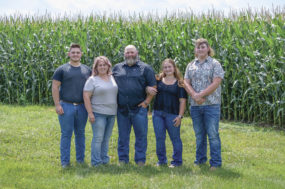A few weeks ago, I sat down with Brian Gerrits from the Breeze Dairy Group to write the cover story of this issue on Spring Breeze Dairy. A turn-key purchase, the facility is running like a top with the addition of a new 72-stall rotary parlor and six-row tunnel-ventilated barn. From an upstairs conference room, we overlooked a peaceful sea of black-and-white beauties as they effortlessly ebbed and flowed on and off the platform.
Standing in front of the window and watching the harmonious hum of milking time, Gerrits seemed just as content as the cows down below. “This is the most rewarding part of this whole project, watching how well these cows just go through the whole thing,” he said. “That was the vision.”
In the short time I spent with Gerrits that day, one thing became very clear. He’s always had a vision for the future and the drive to see it through. Years ago, when he was milking 70 cows in a stall barn, Gerrits was strategizing how to grow his business into something he could pass on to his children. Then, he came across a quote in a newspaper article with a sentence that stopped him in his tracks: “Those who dwell on the past will remain with it, but those who believe in the future will create it.”
That quote became his compass. He wrote it on a piece of paper and tucked it into his planner, saving it for years and turning the words over in his mind each day. “I decided I’m not going to dwell on the past; I’m going to focus on the future,” Gerrits recalled.
Soon after, he determined his future would not be limited to a tiestall barn on the family farm, and he began aligning with other like-minded dairy producers. This led him down a path that eventually brought him to his partners with the Breeze Dairy Group. Today, as the CEO and CFO of a multifamily, multisite dairy enterprise, that same phrase hangs in a frame on his office wall. “It’s my reminder of where we are going and why we exist,” he says.
Figuratively speaking, we may use the term “the writing on the wall” as an ominous warning; however, in the literal sense, it can serve as just the opposite. For Gerrits, that quote – the writing on his wall – provided the impetus to dream big, take calculated risks and embrace change. Those powerful words, prominently displayed and reflected upon daily, embedded themselves in his mind and in his heart. They became more than just something he said; they became part of who he is and what he does.
For Gerrits, that quote became a mantra, words by which he lives. As I look around my own office, I ask myself, “What’s written on my wall?” My eyes drift toward a tired orange sticky note at the bottom of my computer screen, to the words placed in my heart on a rough day several years ago: “And let us not grow weary while doing good, for in due season we shall reap, if we do not lose heart.” (Galatians 6:9 NKJV).
Perhaps there is a verse that touches your soul, a song lyric that strikes a chord or even a quote from this magazine that speaks to you. Whatever those meaningful, motivating words may be, write them out and put them in a place where they can be seen. It doesn’t matter if they are hen-scratched on a Post-it or engraved on a plaque.
The words on which we fix our minds become the rocks on which we stand. They influence how we think and act and, when displayed for others to see, their impact is magnified. We must choose carefully the words we allow into our lives and those we put out for others to receive.
Whether in your home, your farm office or even the milking parlor, a wall without words is a blank canvas, just waiting for you to write your own future. What better time than now to decide what is written on your walls? ![]()

-
Peggy Coffeen
- Editor
- Progressive Dairy
- Email Peggy Coffeen




